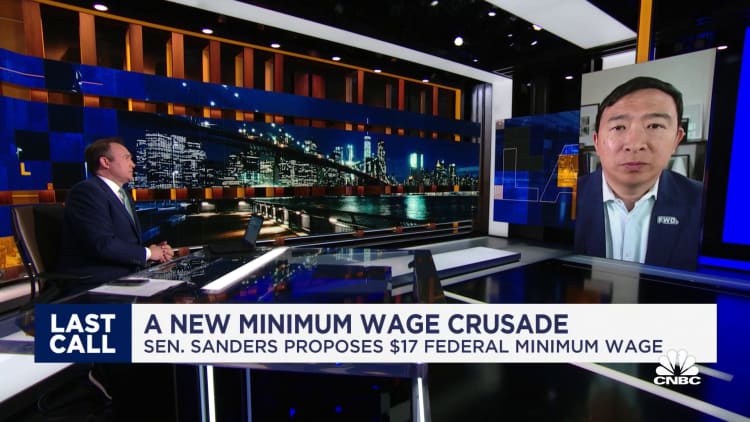Sen. Bernie Sanders speaks on raising the federal minimum wage outside the U.S. Capitol, May 4, 2023.
Anna Moneymaker | Getty Images News | Getty Images
The federal minimum wage of $7.25 per hour has not changed in nearly 14 years.
Last week, Sen. Bernie Sanders, unveiled a new plan to update the national pay rate, which he said is currently a “national disgrace.”
This time, prompted by high inflation, he is calling for $17 per hour, a $2 increase from the $15 per hour for which he and other Democrats had previously advocated.
More from Personal Finance:
GOP senator touts ‘big idea’ Social Security funding fix
What is the debt ceiling? Here’s how it affects you
3 risks for consumers to watch ahead of a possible recession
The change would help lift the incomes of nearly 35 million Americans who currently earn less than $17 per hour, Sanders said.
“In the year 2023, in the richest country in the history of the world, nobody should be forced to work for starvation wages,” Sanders said.
13 states have approved a $15 minimum wage
Today, 13 states have approved a $15 minimum wage, Sanders said. Many of those states are phasing wage hikes gradually. Some companies, such as Amazon, Target and Walmart, have also moved to set a higher minimum pay rate for their workers.
In Raleigh, North Carolina, where Rita Blalock, 57, works at a local McDonald’s, the state’s rate is still $7.25 per hour, in keeping with the federal minimum wage.
Blalock has been able to advocate for a higher wage for herself and currently earns $13 an hour. But living on even that income comes with its struggles, she said.
“We need more money,” said Blalock, who is a member of the Union of Southern Service Workers, which is pushing for a higher minimum wage.

“Anything is better than what we’re actually supposed to be getting,” she added.
In North Carolina, the living wage for a worker with no children is $16.83 per hour, according to the Massachusetts Institute of Technology’s living wage calculator. The poverty wage for that same worker is $6.53 an hour, 72 cents less than the hourly federal minimum wage, according to MIT.
Efforts to raise the federal minimum wage
“Nobody in this country can survive on $7.25 an hour,” Sanders said, while challenging his colleagues in Congress to try living on those wages for one month.
Sanders’ plan calls for raising the minimum wage to $17 per hour over a five-year period, or by 2028. In June, the U.S. Senate Committee on Health, Education, Labor and Pensions (HELP) will mark up the bill, he said.
Nobody should be forced to work for starvation wages.
Sen. Bernie Sanders
U.S. senator from Vermont
Democrats had pursued raising the federal minimum wage in recent years, though those efforts stalled.
In 2019, the House passed a bill to raise the minimum wage to $15 an hour.
In 2021, efforts to include the pay hike in a Covid-19 relief package were prevented due to Senate rules governing the budget reconciliation process. At that time, eight Democratic caucus members voted with Republicans against waiving the objection, which would have allowed the federal minimum wage increase to be included in the package.
A Congressional Budget Office report released that year found the plan to raise the minimum wage would prompt the loss of 1.4 million jobs, though it would lift 900,000 people out of poverty.
When President Joe Biden took office, he promised to address the federal minimum wage in his first 100 days, Blalock recalled.
“We’re way over 100 days,” she said.
Despite congressional gridlock, Biden was able to raise minimum pay for federal workers to $15 per hour through an executive order.
‘A weak minimum wage is bad for the overall economy’
Opponents to raising the minimum wage cite the higher costs those increases would put on businesses. A 2021 CNBC poll found one-third of small businesses anticipated laying off workers if a $15 minimum wage was implemented by Congress.
“We’re not increasing the cost of business,” Sanders said last week, noting that letting workers earn a living wage will help them spend more, which will help businesses.
Economic research backs up the idea, according to Heidi Shierholz, president of the Economic Policy Institute, who spoked at Sanders’ event.
Having a weak minimum wage is bad for the overall economy.
Heidi Shierholz
president of the Economic Policy Institute
Rising inequality means income has shifted away from low- and middle-income workers who are more likely to spend it, she said.
The decline of the real value of the minimum wage is now more than 40% below where it was at its peak 55 years ago, Shierholz said.
“Having a weak minimum wage is bad for the overall economy,” Shierholz added.
In addition to reducing inequality, raising the minimum wage would also reduce poverty, including child poverty, plus racial and gender wage gaps, she said.
However, recent research published by the National Bureau of Economic Research finds the poverty-reducing effects of raising the federal minimum wage may be limited. Under a plan to raise the national pay rate to $15 per hour, less than 10% of the workers who would be affected are part of poor families, the research found.
Not everyone is happy with proposed minimum wage increases. Efforts to raise minimum wage to $16 to $17 per hour in parts of New York have drawn criticism, including from farmers who say it will interfere with their ability to cope with high inflation, labor shortages, supply chain issues and other economic challenges.
However, economists such as Shierholz maintain a higher national pay rate must be mandated.
“If you allow employers who have power to suppress wages or to set their wages really low, they’ll exercise that power,” Shierholz said. “We see that.”











